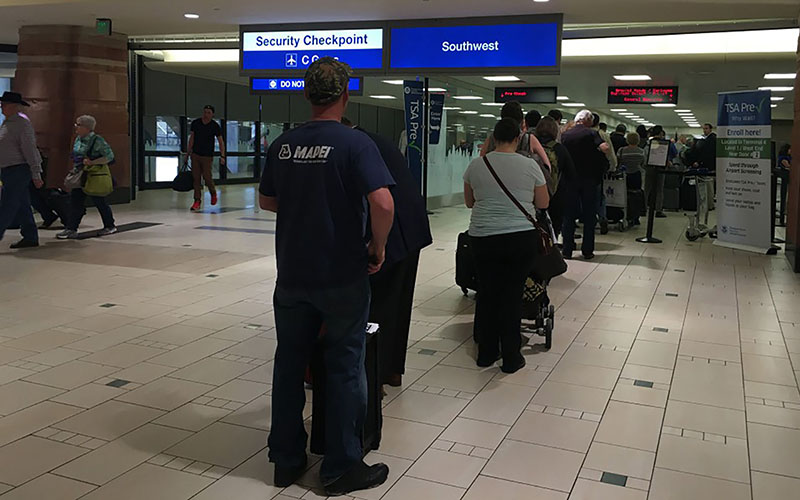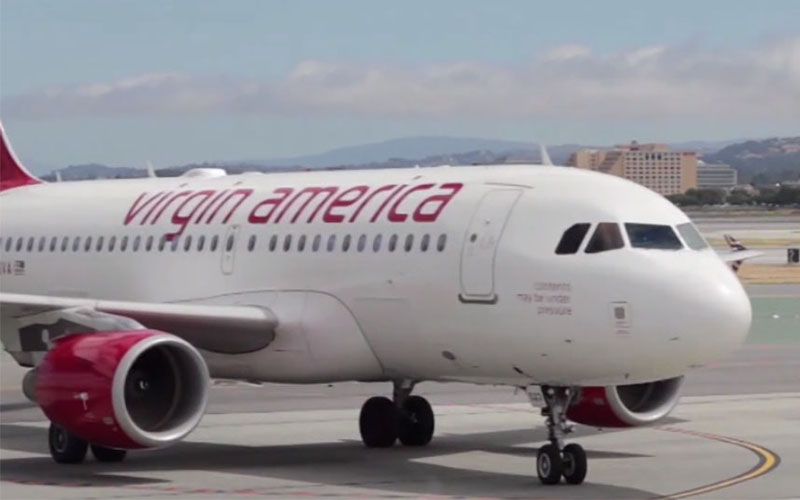
Travelers line up at a security checkpoint at Phoenix Sky Harbor International Airport. While airline service improved last year, passenger complaints were also up. (Photo by Chloe Nordquist/Cronkite News)

Virgin America, the top airline for four years in the Airline Quality Ratings, is going to merge with Alaska Air, a move that experts think will lower the airline’s ranking in the short run. (Photo by CNN Newsource)
WASHINGTON – Airline passengers got slightly better service last year – but they weren’t happy about it.
That was the finding of the 2016 Airline Quality Rating, which said domestic carriers did a slightly better job with on-time performance, baggage handling and denied boardings in 2015, up from a down year in 2014.
But the rate of customer complaints, on everything from fares to customer service, hit the highest level in 15 years, according to the report’s authors.
“Customer complaints about fares and fees perhaps is the reason that we’re at a 15-year high in the number of customer complaint files,” said Brent D. Bowen, dean of the College of Aviation at Embry-Riddle Aeronautical University in Prescott.
“The human element of air travel is obviously deteriorating, and passengers are fed up,” Bowen said Monday at the release of the 26th annual version of the report. Bowen co-authored the report with Dean Headley, a marketing professor at Wichita State University’s W. Frank Barton School of Business.
The report said mishandled baggage fell from 3.62 per 1,000 passengers in 2014 to 3.24 per 1,000 in 2015, while on-time performance rose from 76.2 percent to 79.9 percent. The number of denied boardings also fell, from 0.92 per 10,000 passengers in 2014 to 0.76 per 10,000 last year.
But while those measures were improving, complaints rose sharply, from 1.38 per 100,000 passengers to 1.90 in 2015.
– Cronkite News video by Samantha Witherwax
For passengers at Phoenix Sky Harbor International Airport it was a mixed bag, with the two largest carriers at the airport moving in different directions in the rankings.
Southwest Airlines, the second-largest carrier at Sky Harbor, with an average of 158 daily flights, improved in all four areas rated in the report, with the biggest improvement in its mishandled baggage score, which dropped from 4.09 incidents to 3.31 per 1,000 passengers. Despite its higher scores, however, Southwest remained in sixth place among the 13 airlines studied in the report.
But American Airlines – which is the largest carrier at Sky Harbor, with 295 flights a day – dropped from seventh place to 10th as it saw scores fall in every category but on-time performance, which rose from 77.9 percent in 2014 to 80.3 percent in 2015.
Bowen said the drop in scores for American was likely fallout from its merger with US Airways, which was completed last year.
“One factor we do know, over time all large airline mergers, the airlines go down in performance,” Bowen said. “So for example close to home in Arizona, American and USAir’s recent merger took American down from the seventh position to the 10th position.”
The report was released the same day that Virgin America agreed to be acquired by Alaska Airlines for $2.6 billion. Virgin America has finished first in the report for the last fours, but Bowen said that might change as a result of the merger with Alaska, which has been in fifth place for the last three years.
Virgin America does not fly to Sky Harbor, but Alaska Airlines has seven departures a day from the airport.
“When we look at Virgin America and Alaska, both are pretty highly rated airlines,” Bowen said. “My hope is that they really don’t decline, but since it would be dominated by Alaska … they’re probably not going to be number one for several years.”
But mergers can work out after those couple of years, said Headley. Since 2008, eight of the country’s biggest airlines merged into four carriers, and he said this year’s better overall performance in the industry shows those mergers are settling in to the benefit of customers.
The challenge for all airlines, Headley said, is whether performance improvements can be had as more people choose to fly.
“Bigger has produced some operating gains for airlines, but customer perceptions of poor outcomes are still reflected in a higher number of customer complaints for the year,” Headley said in a statement with the report’s release.
And Bowen said challenges are likely to remain.
“Additionally, airports, communities, and the government agencies must improve the capacity for air travel because there is no indication that air travel growth will slow down in the future,” he said.